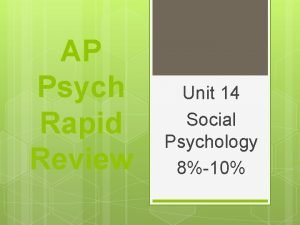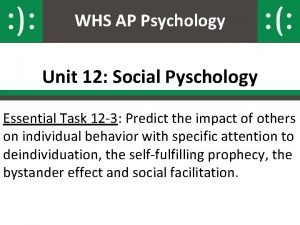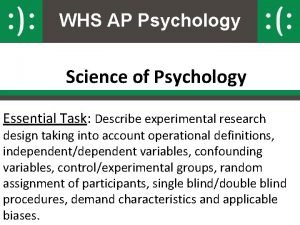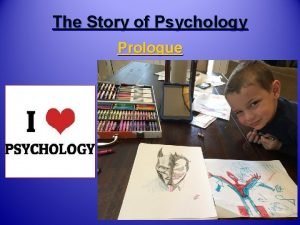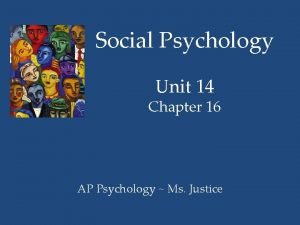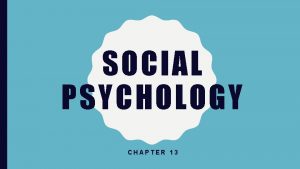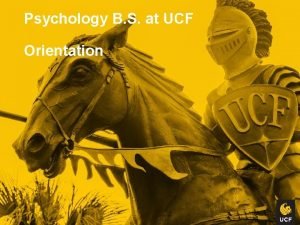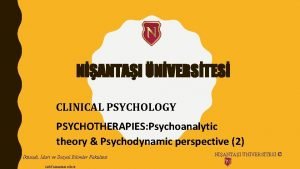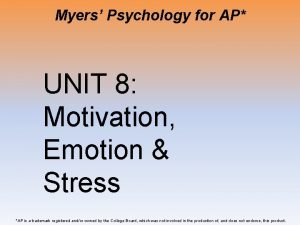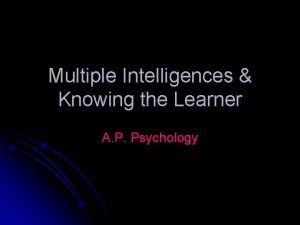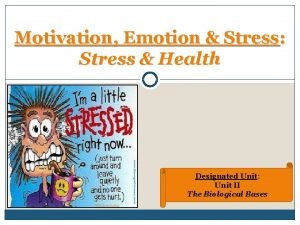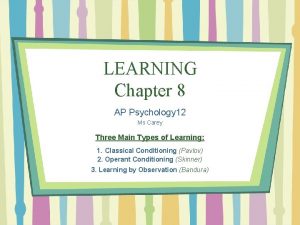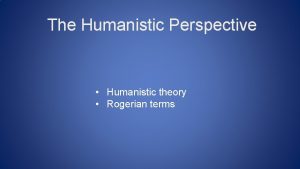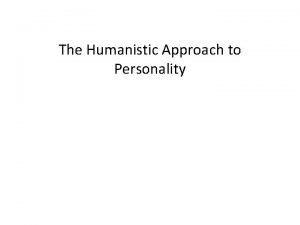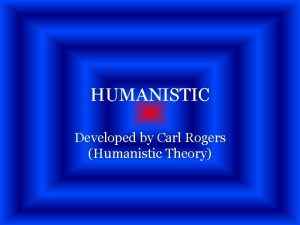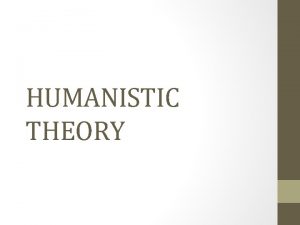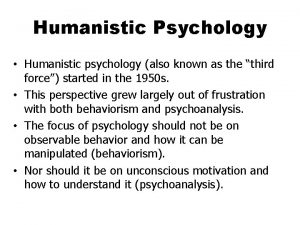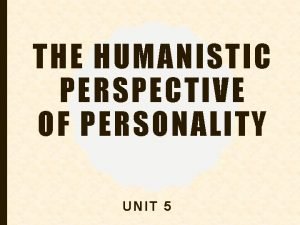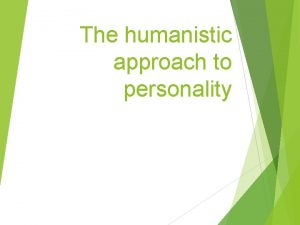Humanistic Theory Year 12 psych Humanistic theory Humanistic













- Slides: 13

Humanistic Theory Year 12 psych

Humanistic theory • Humanistic theory in psychology relates to an approach which studies the whole person, and the uniqueness of each individual. • Rejects Psychodynamic and Behaviorist approaches to personality because they are ‘deterministic’ Assumes: • People have free will – i. e. the choices we make in life, the paths we go down and their consequences • People are good and have an innate need to make themselves and the world better. • Therefore each person is striving for ‘self actualisation’

Maslow • Maslow stated that people are motivated to achieve certain needs and that some needs take precedence over others. Our most basic need is for physical survival, and this will be the first thing that motivates our behaviour.

Self actualization – Maslow • Every person is capable and has the desire to move up the hierarchy toward a level of self-actualization. • Unfortunately, progress is often disrupted by a failure to meet lower level needs. • Life experiences, including divorce and loss of a job may cause an individual to fluctuate between levels of the hierarchy. Therefore, not everyone will move through the hierarchy in a uni-directional manner but may move back and forth between the different types of needs. • Maslow noted only one in a hundred people become fully selfactualized

Rogers • agreed with the main assumptions of Abraham Maslow, but added that for a person to "grow", they need an environment that provides them with genuineness (openness and selfdisclosure), acceptance (being seen with unconditional positive regard), and empathy (being listened to and understood).

Rogers – personality development • Central to Rogers theory -> concept of self/personal identity • If we are to have a well-adjusted personality, there needs to be a good match b/w our • Ideal self = person we would like to be • Self image = the person we think we are • True self = the person we really are • The greater the gap between our ideal self, self image and behaviour, the more likely we are to feel anxious and stressed • Recent research = students whose ideal & self-images weren’t matched were anxious & depressed compared w/students whose ideal & self-images were better matched


Q sort test • The Q-Sort consists of a deck of 100 cards, each containing a fairly specific quality within an individual's personality. Examples would be "very outgoing and social, " "organized and detail oriented, " or "high selfesteem. " • The client is instructed to read each of the cards and to place them on a nine-point continuum ranging from "very much not like me" to "very much like me. " On the initial sort, they are asked to place them according to how they are at that very moment; their true self. • Once all of the cards are placed, they are recorded and the cards are once again shuffled. At this point, the client is asked to redistribute the cards on the same nine-point continuum. This time, however, they are to do so according to their ideal self, or where they want to be once therapy is complete.

Do your own q-sort test. • http: //www. ryerson. ca/~glassman/Qsort. html • On the little table you were given you need to pick 10 words of the list on the website that best describe you. • Once this list is complete do the same, but instead pick 10 words you WISH described you. • Calculate your score! (sum of list A + sum of list B)/(1. 1) = score

Self actualisation - Rogers • believed that humans have one basic motive, that is the tendency to self-actualize - i. e. to fulfill one's potential and achieve the highest level of 'human-beingness' we can. • the potential of the individual human is unique, and we are meant to develop in different ways according to our personality. • Rogers believed that people are inherently good and creative. • They become destructive only when a poor self-concept or external constraints override the valuing process. Carl Rogers believed that for a person to achieve self-actualization they must be in a state of congruence.

Self worth and Positive regard • Carl Rogers (1951) viewed the child as having two basic needs: positive regard from other people and self-worth. • Self worth - How we think about ourselves, our feelings of self-worth are of fundamental importance both to psychological health and to the likelihood that we can achieve goals and ambitions in life and achieve self-actualization. This is developed in early childhood, formed from the interaction of the child with the mother and father. • Positive regard - Rogers believed that we need to be regarded positively by others; we need to feel valued, respected, treated with affection and loved. Positive regard is to do with how other people evaluate and judge us in social interaction

Strengths of Humanistic Theory • Shifted the focus of behavior to the individual / whole person rather than the unconscious mind, genes, observable behavior etc. • Humanistic psychology satisfies most people's idea of what being human means because it values personal ideals and self-fulfillment. • Qualitative data gives genuine insight and more holistic information into behavior.

Limitations of Humanistic Theory. • Ignores biology (e. g. testosterone). • Unscientific – subjective concepts. E. g. cannot objectively measure self-actualization. • Humanism ignores the unconscious mind. • Qualitative data is difficult to compare. • Behaviorism – human and animal behavior can be compared. • Ethnocentric (biased towards Western culture). • Their belief in free will is in opposition to the deterministic laws of science.
 Social loafing ap psychology definition
Social loafing ap psychology definition Ap psych unit 12
Ap psych unit 12 Year six leavers poems
Year six leavers poems Ap psych unit 12
Ap psych unit 12 What is a met call
What is a met call William james known for
William james known for Frustration aggression principle
Frustration aggression principle Examples of altruism
Examples of altruism Ucf psychology classes
Ucf psychology classes Projection definition psychology
Projection definition psychology Myers ap psych unit 8 vocab
Myers ap psych unit 8 vocab Bodily kinesthetic intelligence
Bodily kinesthetic intelligence Lazarus ap psych
Lazarus ap psych Ms carey ap psych
Ms carey ap psych
